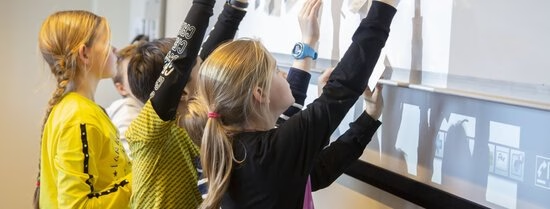You have nearly completed your education and will receive your diploma. You learned a lot and had a great time in Rotterdam. What follows? Where are you going to work? What can you do with a degree from ESSB at Erasmus University Rotterdam? Linda Oosthoek (24) graduated 2 years ago and shares her journey: “Follow your heart. Then you will reach a place where you come into your own, where everything will be fine.”
When she was younger, Linda wanted to become a teacher. “I have a big heart for children. When children came to our house for birthdays, I enjoyed doing things with them. But when I was in high school, I really didn’t know what I wanted to study. It ended up being Pedagogical Sciences. So ‘something with children’, but it is also a programme where statistics and research play a big role. I find that interesting and I am also good at it.”
Van Veldhuizen Foundation
After her bachelor’s, Linda went on to follow a Master Track in Family Pedagogy. During her studies, she carried out an internship at the Van Veldhuizen Foundation, her current employer. Van Veldhuizen offers parenting support and childcare in Rotterdam. Linda’s internship project consisted of further developing an existing programme and doing research on that programme to get it into a national database. She got into it and got it done. This is a great advantage for the Van Veldhuizen foundation, because it can then show that the program is well-founded and likely to produce results. Evidently, the city of Rotterdam, as a provider of subsidies, would like to see those outcomes. Linda remained with Van Veldhuizen after her internship and now works for them as a pedagogue in parenting support.
Parenting Training
In her work, Linda provides group training on upbringing and parenting. She doesn’t see it as a limitation not having children of her own or only having graduated 2 years ago. “In the beginning, I did think: I am still young and inexperienced, can I do this? But I just started doing it, and that’s when you notice how much you learned during your studies! Besides, I am not the one who comes up with solutions. I know the general course of development and what strategies are useful to apply, but a parent knows his or her child best. Every child and every solution is different.” Linda wants to make sure that parents share their experiences during her training. Linda: “You notice that parents benefit a lot from hearing how others have handled certain situations. The only thing I have to do is highlight and explain the positive parenting skills.” Linda is a go-getter. Looking back, she has learned a lot from that mentality. For example, while she was a student, she found presentations horrible. Laughingly: “And now I’m training parents… You can do more than you think!” It is a message that she would like to pass on to current ESSB students: “Take on the challenge, you can do it. Just do it!”
Problem-Based Learning
This morning, Linda hosted online training about playing. She showed a clip about a mother and a child who were doing a puzzle together. Gradually, the mother unconsciously began to take over the puzzle on her own: it had been going too slow for her. “I like to ask the right questions when it comes to clips like that. From this example, we learned that playing also means adapting to the pace of your child.” How Linda speaks about her work shows that she is in the right place. She talks about how her education fits into her work. “During the programme, I learned that play has an essential role. In practice, you learn what that looks like and what conditions need to be met involving play and why. In that, as a parent, you can use play for different purposes. Through training, you already have a lot of baggage, but at the same time, you still have a ton to learn in practice. You never stop learning: that’s what makes me enthusiastic! According to Linda, it’s an attitude that she acquired from her training. “The problem-based learning (PBL) at ESSB relies on your independent problem-solving ability. It took some getting used to in the beginning, but now I can really say that it helps prepare you for your future profession.”
Safe Haven
Linda is happy to be in a profession that lies between practice and science. Her future? Maybe it will be a little more on the policy side, or project-based at a national organisation or the municipality. She doesn’t have a clearly defined path. “For me, the most important thing is that as a professional, I feel confident in my work, and that from there, I can be a safe haven for others.”

